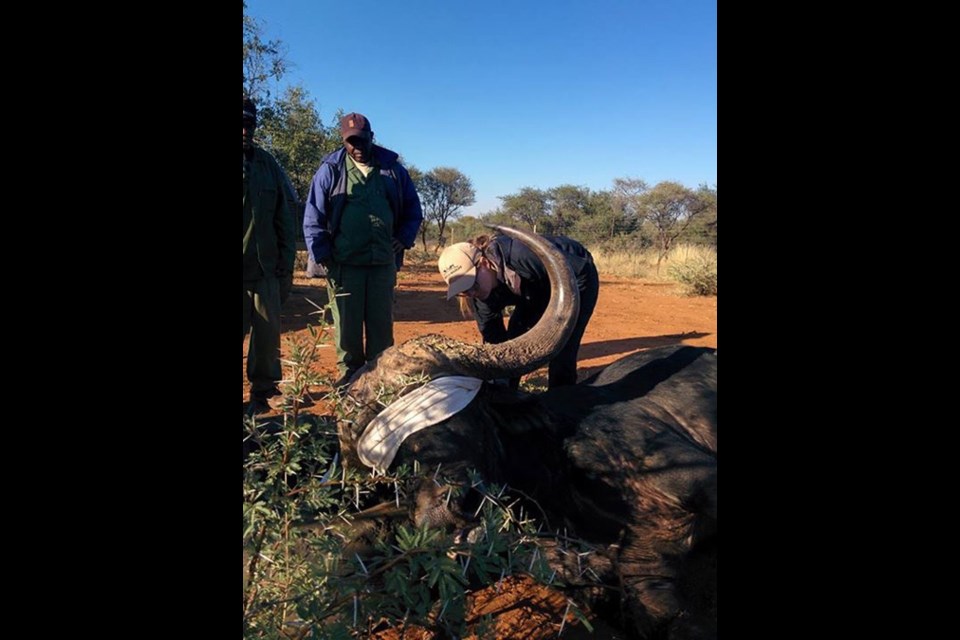For Kaitlyn Brown of Carlyle – who just finished her second year of veterinary school at the University of Saskatchewan (U of S) – knowing animals is an innate part of who she is and this lifelong calling has drawn her into pursuing a career as a veterinarian. Although being passionate about her prospective career was a draw to pursuing becoming a veterinarian, she is also driven by a want to help animals and people.
               “I grew up on a farm and was always surrounded by animals,” Brown remembers fondly. “We had cattle, cats, and dogs, and I always felt close to them; like I understood them. So, because I could understand them, I wanted to be able to help treat them.”
               She smiles as she states that this was a decision she made at 14-years-old and although it has been a lot of work, and a long road to get to where she is, in two more years she will have accomplished the goal she set as a teenager.
               This summer she’s spending working at Head for the Hills and loves the on-the-job education as she is able to shadow the vets there, ask questions, shadow the veterinary techs, and help in various capacities at the clinic based on the schooling she has had thus far.
               Brown’s calling, however, recently had her embark on a unique adventure; the opportunity to travel to Africa to provide veterinary care and experience a different culture was afforded her as a second year veterinary student.
               “The school has a club, Global Vets, it’s a student run program, so it wasn’t through any organization, but second year students have the opportunity to plan a trip to a developing country and work as veterinarians there,” Brown explained. “To plan the trip you just need vets on the other side to say they would like you to come and then you fundraise. You then go over for four to six weeks depending on the trip planned.”
               Although opportunity was there, the calling to do it was something more: “I’m getting a very special education that not everyone has the privilege of doing. I like being able to share my knowledge and skills to help people. It’s not just a career, it’s a passion, and helping animals, helps people as well in a really special way.”
               Brown was in Africa for six weeks beginning at the start of May and returning midway through June. Within that time visited three different countries: Zanzibar, Â鶹ĘÓƵ Africa, and Madagascar. Traveling with her were three other girls from the U of S they were also joined in Madagascar by researchers from the United States, vet students from the United States, and a veterinarian from Australia.
               “It was very different depending on where I was,” Brown states. “In Zanzibar we worked as vets full-time and helped clients, but what they specifically wanted help with there was helping with their feral cat population. So, while we were there we spayed and neutered cats, vaccinated them for rabies… and dewormed them.”
               “In that time we probably spayed and neutered about 50 cats.”
               They were then off to Â鶹ĘÓƵ Africa where they had the opportunity to work with farmed wildlife such as antelope and buffalo: “We would have to dart them down because they are wild animals and we would then vaccinate and deworm them and provide any other treatments they needed during that time as well.”
               While, in Â鶹ĘÓƵ Africa, Brown was able to fit in a little touring in her busy schedule and they were able to visit Kruger National Park: “We went on a safari, so we got to visit Kruger National Park, not as a vet, but to be able to see all of the animals there, which was amazing.”
               Her next stop took her to Madagascar: “We worked with Mad Dog Initiative there, which is run by two Malagasy vets. They’ve set up free clinics in remote areas of the island and find volunteers to help run them.”
               “We were set up in a small, remote village – Andasibe – where we usually spayed, neutered, and vaccinated animals for rabies; then we would also help with any other medical procedures needed.”
               Although the entire trip was an amazing experience, Brown says that something she will hold with her is how much the people in Madagascar loved their animals. Although the people there were in remote areas and it could be difficult for an owner to get their animal to the free clinic, they would make sure they did and the clinic was flooded with people there wanting to ensure their animals were helped.
               “My favourite part about Madagascar were the people in the village and the people we worked with, they all had an amazing spirit,” Brown explained. “My favourite part of being in Zanzibar was the experience of surgeries I was able to have. And my favourite part of Â鶹ĘÓƵ Africa was all of the exotic animals we got to see, it’s honestly an animal lovers dream.”
               Brown’s future is bright as she pursues her final two years of veterinary school with the intention of being able to work privately and make a living as a vet, but she hopes to continue sharing her knowledge and skills in a volunteer capacity as well to ensure she is able to help as many people and animals that she can.




